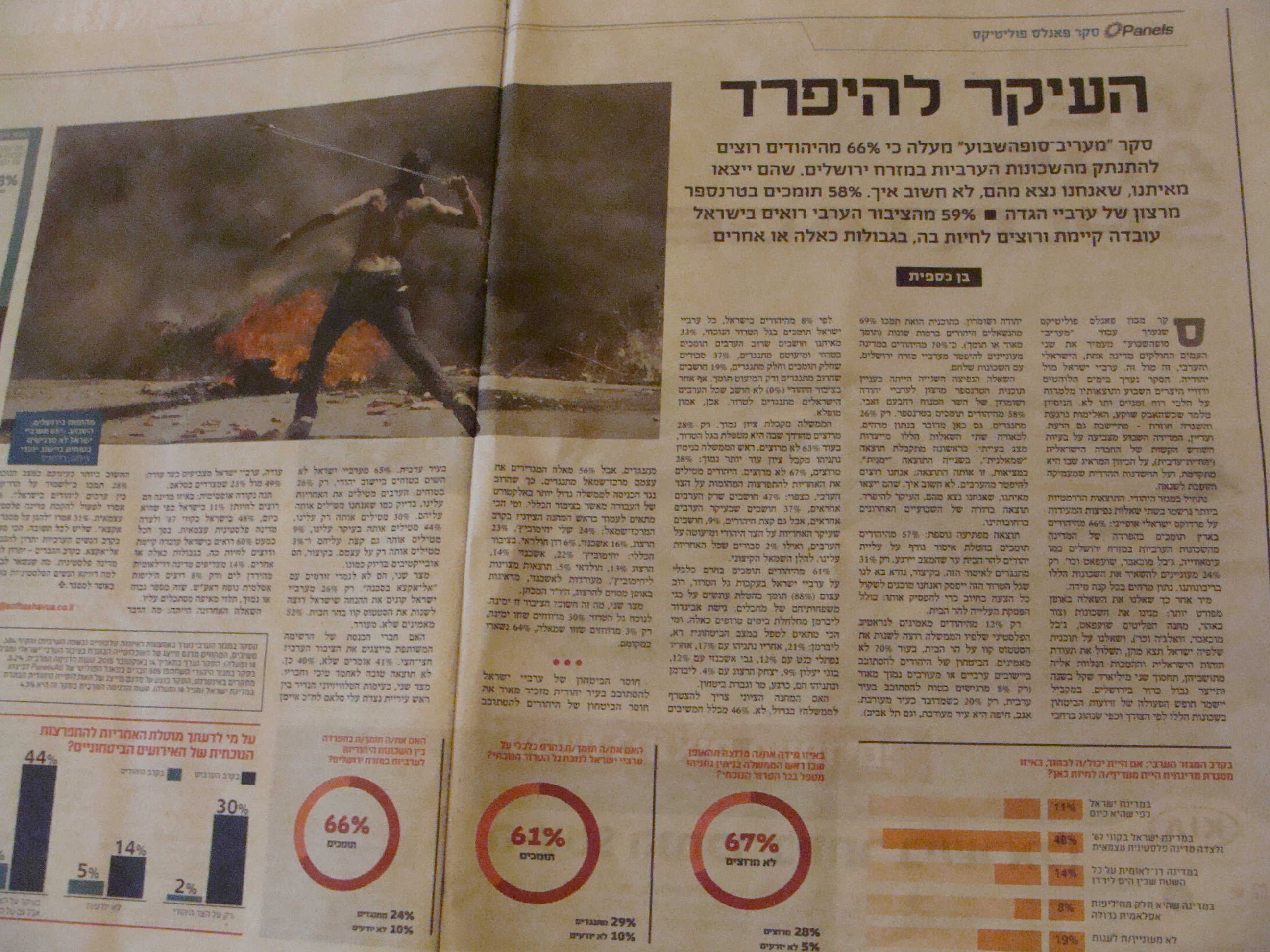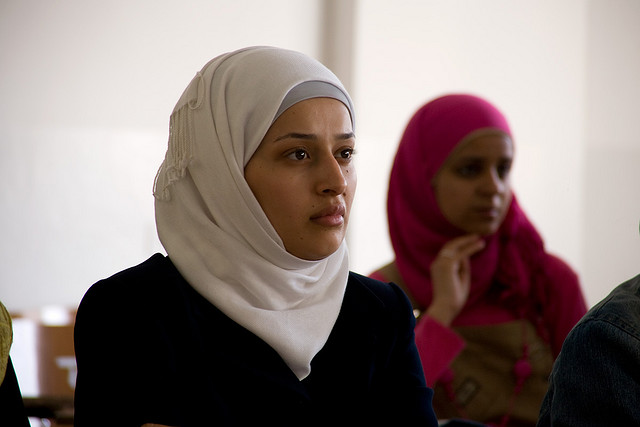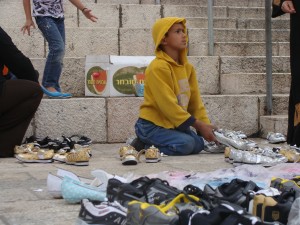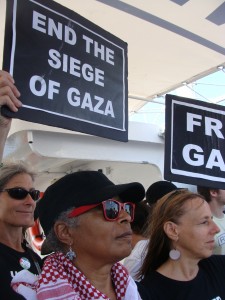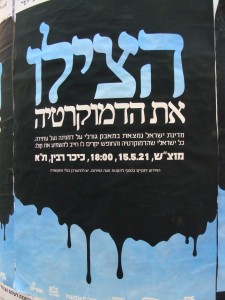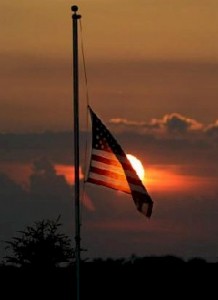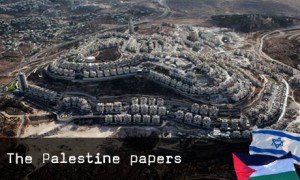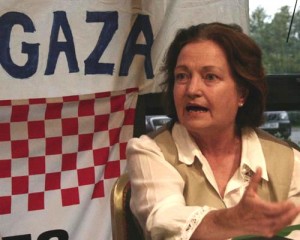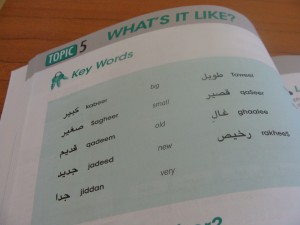The World Post at The Huffington Post, October 23, 2015
It’s Wednesday night. I’ve just left the memorial for Habtom Zarhum, the Eritrean asylum seeker who was mistaken for a Palestinian during the attack on the Beersheba bus station. Zarhum was shot by a security guard and was then “lynched”by an Israeli mob. They cursed the asylum seeker, spat on him and kicked his head as he lay on the ground bleeding.
The gathering held in Zarhum’s memory took place in a south Tel Aviv park, near the Central Bus Station. I board a “sherut” — a minivan that serves as a shared taxi — to head home.
Two older women are seated inside. They’re Mizrachi, Jews from Arab lands. It’s easy to tell from their accents. As I make my way past them, I squeeze past a large suitcase, which is taking up much of the aisle.
“Is it yours?” one of the women asks.
I cluck my tongue — the standard Israeli response for no.
A young man gets on behind me.
“Is that your suitcase?” They ask him as he sits down. A foreigner, he offers them a vacant look. He wears a kippah and a smile.
“Ken,” he says, yes.
“Take it,” one of the women commands.
The man, whom the women have already dubbed “the Frenchman,” does nothing. I gather he doesn’t speak Hebrew.
“Nu, come on, take it already! I don’t want it exploding next to me,” she shouts.
The woman is saying what the others around us were surely thinking. Whose suitcase is this? What’s in it? It’s what we call a “hefetz hashud,” a suspicious object.
“Maybe we should check it,” her companion says as the sherut starts to move. “Is it his? The Frenchman’s?”
The women don’t speak English so they continue yelling at him in Hebrew, trying to ascertain that the suitcase is, indeed, his and trying to figure out what’s in it.
“Is this your suitcase?” I translate for the young man.
“Yeah, it’s mine,” he says. He’s got a heavy American accent.
“The women want you take it.”
He wheels it down the aisle. But this doesn’t calm the women down. A few blocks later as the driver slows to pick up a passenger, one of them shouts “Don’t let him on, he looks suspicious.”
The driver ignores her, stops, and the man boards.
It’s quiet as he walks down the aisle, the woman’s remark still in our ears. We size him up. He sits down. It’s silent as faces pivot towards him, eyes trying to read his clothes, his hair, his skin, his facial expression, his movements. Does he look nervous? Is he reaching for something in his pocket?
He takes the only open seat, in the back row, wedged between the American-“Frenchman” and an Ethiopian Jew who wears a kippah. I wonder if he wore it a week ago, before Zarhum was killed. Or is it something new, something so he won’t be mistaken for a non-Jew, a terrorist.
The sherut lurches forward and, after a few uneasy moments, the women — who mention that they’re visiting Tel Aviv from Ashkelon — start chatting with the driver, asking him if it’s safe here.
“Sure,” the driver says. “This is Tel Aviv. What do the terrorists want with us? We’re all left-wingers. Vegans, everyone!”
Tel Aviv is known to Israelis as habuah, the bubble, because it is supposedly very different from the rest of the country. Here, the thinking goes, we’re isolated from the conflict. Here, everyone is, supposedly, a liberal.
“The leftists loves human beings,” the driver adds.
The women grow defensive. “We’re right-wing,” one says. “And the rightists love human beings, too.”
“But are you vegan?” the driver asks.
“What are you crazy?” one answers.
The driver launches into a speech, one he has clearly given many times. Eventually their discussion, which turns into an argument, becomes about kashrut, keeping kosher. Then the women identify themselves as masorati, traditional — like many other Mizrahi Jews, they’re neither secular nor religious. This leads, inevitably, to the driver asking them about their family roots. The women’s parents come from Yemen and Morocco.
“So you’re Arabs,” the driver says, adding that his family are Yemeni Jews, too.
“Gross,” the women shout. “We’re not Arabs.”
“Listen to your own accent,” the driver insists. “You’re an Arab. It’s okay. We’re all Arabs here.”
The women make noisy protest, one of them saying that Arabs are murderers and terrorists and that she is a Jew. As though Jews don’t kill people, too. As though dozens of Palestinians haven’t been shot to death by Israeli forces in recent weeks.
I realize, too, that she’s dehumanized both the Palestinians and the Jews in one fell swoop. Palestinians are “monsters” who kill people; Jews are saints who join the“most moral army in the world.” As an American-Jewish-Israeli who is married to a Palestinian, I’m doubly offended.
I also want to tell them that one can be both an Arab and a Jew. The child I’m carrying in my belly — our first, a girl — is living proof.
But I keep my mouth shut because there’s two of them, one of me, and who knows what the other people on the sherut think, how they’ll react.
The second woman takes a different approach than her friend, explaining to the driver that we have to distinguish between language and culture versus ethnicity. She admits to having the accent and, maybe, even some of the culture. “Sure, I cook some of the food,” she says. But that’s where the similarities end, in her mind.
“I’m not an Arab,” she says. “I’m a Jew.”
The driver, whose eagerness to embrace his Arab roots is uncommon amongst Israeli Jews, gives up. He steers the topic back to safer territory.
“Do you eat eggs?” he asks the women.
They say that they do.
“How can you eat eggs? Have you seen the cages those poor chickens live in?”
If he can’t persuade the women to embrace their Arabness, at least he’s going to make good vegans out of them.
***
As I ran errands in Tel Aviv last weekend, I passed a kiosk. The mainstream Hebrew daily Ma’ariv grabbed my eye.
“66%: Separate from the Arab neighborhoods in East Jerusalem,” the headline read.
The picture below showed the cement blocks that were placed around Palestinian parts of the city last week.
I was intrigued. Giving up on half of Jerusalem — which Israel claims as its “eternal, undivided capital” — is usually associated with the “left” (I use the term loosely in regards to the Israeli left — many argue that there isn’t a left left here). But the past few elections have shown that the public has moved right.
As I studied the picture, I wondered if the uptick in violence has made Israelis realize that the occupation is unsustainable, if they finally see that attempting to control another people — by corralling them into ever shrinking spaces like the one shown in the picture, by restricting their freedom of movement — is not only impossible but inhumane.
I took the bait and bought the paper. After I picked up a few things from the market, which was a bit quieter than usual but still busy, I headed home and settled in to check out the article about the survey.
When I opened the paper, I was disappointed.
“The principle is to separate” the headline said.
The poll revealed that while, yes, Jewish Israelis say that the state should leave the Palestinian neighborhoods of East Jerusalem — which writer Ben Caspit admitted is “left wing” — 58 percent also support a “voluntary transfer” (whatever that means) of “West Bank Arabs” (read: Palestinians).
Where are they supposed to go? I wondered.
Caspit accurately pointed out that this is a “right wing” sentiment. “In reality, it’s the same result,” he continues. “We want to quit the Arabs. It’s not important how. That they’ll leave us, that we’ll leave them, the principle is to separate.”
But separation — which was formalized and deepened by the Oslo Accords — has only made things worse. It has wrought our current reality. It has brought us to the present day, to two peoples who think of the “other” as faceless enemies.
Then there’s the issue of collective punishment: 61 percent of Jewish Israelis who were surveyed “support an economic boycott of Arab Israelis following the ‘wave of terror.'” And 88 percent support “punitive measures towards the family members of terrorists.”
The latter translates to home demolitions — after a Palestinian kills a Jewish Israeli, the state destroys the family’s house, even if the suspect himself is dead or in jail. Violence begets violence begets violence.
Where will it end?
And that glimmer of hope that I’d had — that recent events had led Israelis to understand that they need to give up on the occupation, that they’d moved to the “left”? On the contrary. The survey showed that despite the “wave of terror,” 64 percent of Jewish Israelis have not changed their political affiliation. “Only three percent report that they’ve moved left,” the article says, while 30 percent have moved further to the right.
Hold that one-third in your mind as you consider this: 67 percent of Israelis aren’t satisfied with how Netanyahu is handling the “wave of terror.” The next government will likely be even more right-wing than this one.
***
While I don’t know a lot of rightists — politics are divisive here and people self-segregate into like-minded groups — their conversations are omnipresent. On the bus, in cafes, in restaurants. And what I hear leaves me even more disheartened than what I see in the newspapers.
Wednesday, on my way to Zarhum’s memorial, I sat and had lunch at a hole-in-the-wall Persian place. Three middle-aged men and a young soldier sat at the table next to me. One of the men remarked that the place, which is usually busy at lunch time, was empty.
“Where is everyone?” he asked. “It’s because of the matsav, the situation, I guess.”
“The situation” — that’s what Israelis call the conflict.
The men began to chat about recent events, one casually mentioning that not only should terrorists’ homes be destroyed, but their families should be deported.
This, another chimed in, is the solution to the conflict. “Deport all of them and put walls on every border.” He took a bite of his food, chewed. “What can we do? We already live in a ghetto.”
A brief argument about the West Bank follows. If we annex it, one says, “All the Arabs will come here.”
“But if we leave, it will turn into Gaza,” another declares. “There’s nothing to do.” Both separation and occupation must continue.
The soldier complained that his commander is some sort of leftist who “wants a peace agreement with the Palestinians.” He snorts. “If we had a peace agreement with them, they’d make a “balagan.” A mess.
***
I’m saddened by this conversation and the poll, too, but I’m not surprised. When the violence ticks up — when the Palestinians no longer take dispossession and occupation like docile lambs — Israelis don’t self-reflect. They don’t ask “why are these people angry?” “What might they be trying to say?” “Have we done something to provoke this?”
Instead, Israelis look for simple, external answers: They’re anti-Semites, they hate us, they want to kill us, they want to drive us into the sea.
While I don’t understand this utter inability to self-reflect, I have to admit, I understand where it comes from: fear. I feel it, too, as I move through Tel Aviv. I, too, eye the people I pass on the street, sizing them up. Forget about racial profiling — I’m scared of everyone I don’t know right now. I try not to stand too close to anyone, God forbid they pull a knife out of their bag or pocket. Soldiers and police seem to be targets of attacks, so I make sure not to get too close to them, either, as I don’t want to get caught in the crossfire.
An elderly man and his wife — tourists who speak heavily-accented Hebrew — try to stop me and ask for directions one afternoon and I shout the directions to them over my shoulder as I keep moving.
That, I figure, is the key. Just keep moving.
I realize my thoughts and behavior are absurd. Totally irrational.
But even my husband — who is one of those “West Bank Arabs” that most Jewish Israelis would like to see transferred “voluntarily” — says he is more worried about me now than he was during the war last summer. Because “anything can happen anytime anywhere.” It could be a Palestinian attacker, it could be an armed Jewish Israeli who freaks out. Who knows?
And as I talk to people, I find that I’m not alone.
“It doesn’t matter if you’re a blonde, even,” an acquaintance says, speaking of the hysteria and panic that seem to be spreading through Israeli society, “someone starts screaming that you’re a terrorist and you’re done.”
***
On Wednesday, after I left the restaurant, I headed to south Tel Aviv to conduct some interviews related to my book and to attend Zarhum’s memorial. As I passed the Central Bus Station, I noticed that there were even more guns here than a week ago. It wasn’t just the increased police and army presence. I also saw several civilians — all of them men — with handguns tucked into the waistbands of their pants or jeans.
The firepower didn’t make me feel safer. On the contrary. I crossed the street to try to get away from the police and soldiers — again, they’re targets — but there they were, on the other side of the road, too. Looking at all the uniforms made me feel like I have a reason to be worried, that there’s something to be anxious about and I began, again, to look intently at the people around me.
I passed a policeman. We made eye contact. I realized he’s sizing me up and I understood just how on edge he was — how on edge everyone is — when even a pregnant Jewish Israeli woman waddling down the street like myself can be considered a possible threat.
It struck me that this pervasive sense of fear and insecurity that has begun to permeate every aspect of life here — that sense that anything can happen anytime anywhere — is familiar. It reminds me of what I felt when I lived in the Occupied Palestinian Territories, of how I felt when I passed through a checkpoint, of how I felt when I heard that soldiers were raiding houses down the road from me.
No, Israelis are not under occupation. But now they’re getting a little taste of what those “West Bank Arabs” and East Jerusalemites feel on a daily basis. They’re getting a little taste of what comes from inequality, occupation and separation — things that Israelis view as necessary to their survival, things that won’t be going away anytime soon.
Welcome to Palestine.
